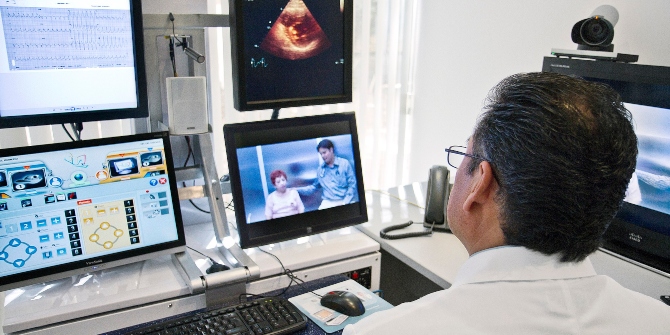
As we are slowly preparing for lockdown restrictions to ease, healthcare professionals, managers and IT practitioners are wondering what changes to work practices and new models of healthcare provision that have resulted from the rapid deployment of digital technologies should be sustained beyond the current crisis.
Indeed this is a pressing question, which we are keen to pursue. First, we need to ask what changes have taken place to the way healthcare professionals work and deliver care, patients engage in their healthcare, and the way we introduce new technologies in healthcare. Second, which changes we want and should sustain. And third, what is required to embed those changes in the existing systems and processes.
We know that with a huge amount of support from the private sector, a range of digital tools have been adopted for communication with the public, for communication between professionals and coordination of care, for providing direct patient care, remote rather than face-to-face interaction, for learning, and for managing resources. Digital tools for communication such as WhatsApp have been utilised in order to organise service provision or manage staff rotas, which may be fast changing due to staff sickness or self-isolation. Social media platforms have provided a space for sharing information, for example among doctors for the use and availability of personal protective equipment (PPE) and procedures for self-isolation.
For direct care, digital approaches have arisen out of a need to shield vulnerable patients from being exposed to the risks of coming into hospital, promoting social distances and protecting staff in both the primary and secondary care through basic telephone-based consultations to telemedicine consultation approaches. For learning, digital tools such as innovative e-learning packages have also been used for rapid education of the healthcare workforce on how best to manage the respiratory conditions encountered, or for the rapid redeployment of education to staff who have had to change their roles during the pandemic. For supply chain management, digital solutions have been offered to support critical management of reordering of PPE and other goods. These digital technologies, and practices they support, often have to fit with existing structures, processes and information systems.
We need to study how exactly these technologies have been used in different areas of healthcare and to what effect. Evaluation needs to be multifaceted and include impact on organisational effectiveness, quality of care and work and, in the longer term, on health outcomes. We are particularly interested in exploring the lived experience of working with these new digital tools from the frontline, from a middle and senior management perspective and from patients’ experiences.
Our previous research has revealed that implementation of digital tools may lead to more cumbersome procedures that make ‘workarounds’ necessary, different spatial and temporal distribution of work, shifting of responsibilities and challenging professional power and sense of identity. Although digital technologies offer possibilities for improving health systems, full benefits are often not realised, as our study of a mobile phone-based information system for the control of neglected tropical diseases in Tanzania has shown. All of those (and many other factors we discuss elsewhere) have resulted in often slow uptake of digital technologies in healthcare.
But has the Covid-19 crisis triggered a change of attitude? It seems so. Many participants in webinars on digital responses to the pandemic have voiced hope that various transformations that have occurred would continue. Of those, they single out the way different people and institutions across health and social care are now willing and able to share information, communicate and collaborate in order to provide better care.
They note the way in which whole sectors, and in particular primary care, have been transformed and patients en masse have experienced (and perhaps liked) a different way of receiving care. All those changes bring challenges, not least making sure that we do not exclude those who really need care the most – the vulnerable and disposed.
Furthermore, the rapid adoption of digital technologies and the increased willingness to share data have been achieved, at least partly so, by sweeping away not only the ‘bad’ bureaucracy, but also stringent information governance rules. Thus, more questions arise: What regulations, structures and processes do we need to review and develop to sustain positive aspects of the transformations that have occurred? What relationships and competencies do we need to maintain and develop? How should digital technologies be designed and implemented to better support the staff, patients and citizens? How will those new tools interface with existing information systems?
In short, we desperately need more research.
♣♣♣
Notes:
- This blog post appeared originally on the LSE Department of Management blog.
- The post expresses the views of its author(s), not the position of LSE Business Review or the London School of Economics.
- Featured image by Intel Free Press, under a CC-BY-SA-2.0 licence
- When you leave a comment, you’re agreeing to our Comment Policy
 Ela Klecun is an assistant professor of information systems at LSE’s department of management. Her main research interest is the application of IT in healthcare and its consequences for the way services are organised, delivered, and consumed. Her research has been funded by various UK research councils and published in major journals.
Ela Klecun is an assistant professor of information systems at LSE’s department of management. Her main research interest is the application of IT in healthcare and its consequences for the way services are organised, delivered, and consumed. Her research has been funded by various UK research councils and published in major journals.
 Shirin Madon is an associate professor of information systems and socioeconomic development at LSE’s departments of management and international development. Her current teaching is in the area of ICTD and humanitarian emergencies management and development. She currently serves as an associate editor for the journals Information Technology and People, and Information Technology for Development.
Shirin Madon is an associate professor of information systems and socioeconomic development at LSE’s departments of management and international development. Her current teaching is in the area of ICTD and humanitarian emergencies management and development. She currently serves as an associate editor for the journals Information Technology and People, and Information Technology for Development.






For direct care, digital approaches have arisen out of a need to shield vulnerable patients from being exposed to the risks of coming into hospital, promoting social distances and protecting staff in both the primary and secondary care through basic telephone-based consultations to telemedicine consultation approaches Is the best part,
I am a student of certificate of higher Education in Health and Social Care Level-4.
‘For direct care, digital approaches have arisen out of a need to shield vulnerable patients from being exposed to the risks of coming into hospital, promoting social distances and protecting staff in both the primary and secondary care through basic telephone-based consultations to telemedicine consultation approaches.’
This statement is highly impact on the readers
The intersection of technology and healthcare is evolving rapidly post-lockdown. It’s impressive to see the healthcare sector’s adaptation to digital tools.